STÉPHAN BERNHARD: An Alsatian, French, and European Chef
In mid-July thanks to the Tourist Board of Baden-Baden I spent three days in this charming spa town in Baden-Württemberg. I visited several museums: Frieder Burda devoted to contemporary art, another to the history of the town of Baden-Baden from prehistoric times to the present, and a third to the Russian jeweler family Fabergé; its two municipal spas: the nudist Friedrichsbad and the Caracalla Baths; its mountain view called Merkur Mountain and the Cistercian Lichtenthal Abbey, a still-functioning nunnery in existence since 1245. One evening my husband and I were guests at “Le Jardin de France” with one Michelin star since 1999, where I interviewed its owners, chef Stéphan Bernhard and his wife Sophie, manager, maître and sommelier. Our menu: Lobster with vinaigrette, pea purée, ginger, mint and orange peel, sweet and sour tomatoes, and wild herbs; local venison with hazelnuts, cheese dumplings (käseknepfle), chanterelles, and cherry compote with cardamom and meat balls (frickadelle); and elderberry-black currant soufflé. Our meal was accompanied by Weisburgunder Weingut Kopp 2013 and Spätburgunder Weingut Knopp 2013 Jagdhaus Hubertus.
Our tastes in food are closely connected to our childhood; what are your first memories of food?
My father cooking at home. Also his mother cooked very well. We had a huge vegetable garden and many types of fruit trees, which provided us with wonderful seasonal produce. Therefore I had the lucky chance to taste many different things when I was very little. Since I’m Alsatian I particularly remember plums, strawberries, raspberries, and rhubarb. I use these local ingredients often in my cuisine.
You were born in Colmar. Do you consider yourself Alsatian or French?
I consider myself, Alsatian, French, and European in that order. When I was a child I considered myself Alsatian. As a teenager I considered myself French. I think of myself as European since we moved to Germany. Where you come from is not important, it’s what you do together, how successfully you work together, co-operate that is essential. My spirit is European.
What are your first memories of cooking?
When I was young, I wanted to become a pastry chef because I loved cakes. But I noticed soon after I began working in a bakery, that I would have to get up very early, at 4 AM
every morning, and that would have been catastrophic for me. So I decided to work in a restaurant instead, but even that was a shock.
When did you decide to become a chef?
My family didn’t have enough money to eat in restaurants. I didn’t even know that people ate in restaurants on Monday, Tuesday, Wednesday, and Thursday… I thought they ate in restaurants only on Friday, Saturday, and Sunday. I loved my life in this first restaurant’s kitchen. It was called “Am Lindenplatzl” and was in Mittelbergheim. After a very short time there, I knew cooking would be my profession and decided that someday I wanted to have my own restaurant. I was sixteen. Nobody in my family before me, except my grandmother for a very short time, had every worked in a restaurant.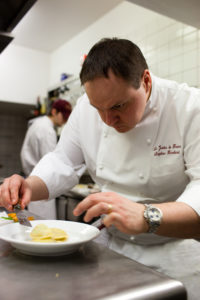
Who was your mentor? What did you learn from him or her?
The chef at “Am Lindenplatzl”, where I did my apprenticeship. He opened my eyes. He taught me to prepare each dish as if it was for me, as if I would be the one eating it. His name was Patrick Durot. I went to the market with him. His kitchen was always in perfect order.
After “Am Lindenplatzl” still most of your professional experience took place in France and your wife Sophie is French, Alsatian like you, so why did you decide to open a French restaurant in Baden-Baden and not in Alsace or somewhere else in France?
My cultural background is French. The culture of cooking is French too. I wanted to open my restaurant in France, but one day we came to Baden-Baden and discovered this beautiful town that I thought would be the ideal place for opening a good restaurant. Baden-Baden is very pro-French, Francophile. “Le Jardin de France” is not our first restaurant in Baden-Baden. We had another one before in another place for four years.
How did you meet?
Sophie lived across the street from the restaurant, “La Couronne” in Baldenheim, Alsace, where I had my first paying job. I gave her bones for her dog. I didn’t really care about the dog. It was an excuse to be with her. Then she came to help out at the restaurant and I knew right away she was the woman for me.
Am I right that Sophie is the manager, maître and the sommelier here at “Le Jardin de France”?
Yes.
You and Sophie spend 24 hours together; how long have you been working together?
Eighteen years here in Baden-Baden; 14 here at “Le Jardin de France” and 4 before in another restaurant. And before that too in Alsace.
What do you especially admire about her?
Her strong character. I needed a woman with a strong character. I’m the boss in the kitchen; she’s the boss in the dining room and wine cellar. At home it’s more complicated.
Something about her that irritates you?
She always waits until the last minute to take action. She needs enormous pressure to start a project, but once she starts, she works hard, like a maniac, until the job is finished, especially when it comes to paperwork. Instead I’m very organized, structured, and plan and do everything step-by-step.
In a nutshell how would you define your cuisine?
Seasonal. As much as possible kilometer 0. I look at the products at hand that nature has given us and then I decide how I can combine them. I think about what I’d enjoy preparing and eating myself at that meal. It’s all about what I want at that moment.
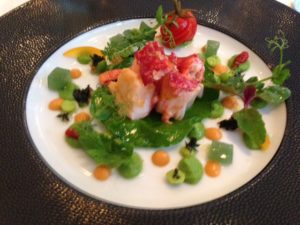
Lobster vinaigrette, pea purée, ginger, mint and orange peel, sweet and sour tomatoes, and wild herbs
What is your culinary philosophy?
Cuisine from the heart.
What is Alsatian about your cuisine?
Its origins, its basic concepts, and its influence on my early development.
What are your specialties?
Pan-fried foie gras with mirabelles, Lobster with Cep mushrooms, and whatever I want to eat myself at the moment I’m starting to prepare the meal.
What are the essential qualities of a top chef?
To like people, to enjoy working hard all your life, to want to please your guests, to be curious, to be open to new ingredients, to enjoy creating new dishes, and most importantly to be a good manager because a restaurant owes its success not only to its head chef to its team in the kitchen. We are six in my kitchen. Three of us are German and three French. The Germans are hard workers; the French are creative and dreamers.
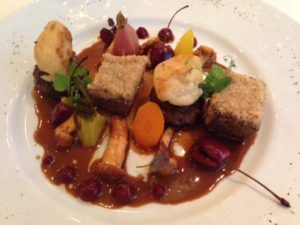
Local venison with hazelnut, kaseknepfle, chanterelles and cherry compote with cardamon and meat balls (frickadelle)
What do you like most about your work?
Finding the best possible producers and products. For example, searching for and then discovering which truffle hunter is likely to have the best truffles. Knowing that we’re offering our guests products at the very top of the each market, whatever they be, truffles, wine, game…
The least?
That I don’t have enough time for my children.
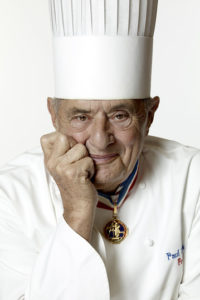
Paul Bocuse
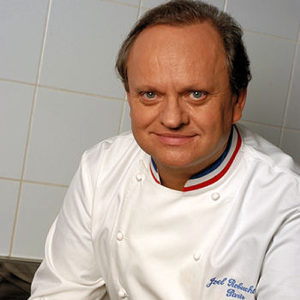
Joel Robouchon
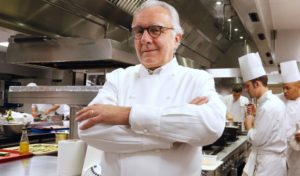
Alain Ducasse
Other chefs you admire?
I like to eat out and I admire all chefs, obviously Paul Bocuse, who have worked hard to earn the recognition they deserve. These would certainly include Robouchon, Ducasse and Wohlfahrt.
Your feelings about restaurant guides?
They are useful for us restaurateurs and also for our guests, but they are not the end all and the be all. The most important thing for us are guests who keep coming back to eat here. If our guests continue to come back, we too continue to exist and live happily. That’s how we make our living. If you publish this interview, that is not the most important thing for me. The most important thing is that my guests continue to come back, taste my cuisine, eat well, enjoy themselves, and are inspired to return again and again.
Up to now we have talked about Stéphan Bernhard the chef; I’d like to know more about Stéphan Bernhard the person. For example, what are your favorite foods to eat? To cook?
To eat: an omelet with potatoes and black truffles because I love black truffles and Provence. I love to go to Provence, Vaison-la-Romaine, near Orange, when I have some free time. Eggs and truffles, potatoes, products of nature. A simple, yet noble, meal, an omelet with truffles or potato purée with truffles, with friends. That’s bliss!
To cook: turbot. It’s my favorite fish. Mushrooms. I love to eat wild mushrooms too. Last-minute dishes.
A dish you dislike?
Anything complicated to prepare. When I was little I hated red beets. Now I love to prepare and eat dishes with red beets.
Your favorite wines?
Wines from the Rhone Valley: Hermitage, Châteauneuf-des-Papes. Red wines that need food to get even better. Dishes like braised beef cheeks.
Your favorite dessert?
Floating Island and fruit soufflés like the one I served you.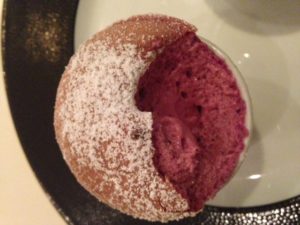
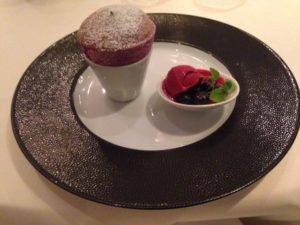
Elderberry soufflé
Your favorite spice?
Piment d’espelette. I don’t like strong spices. I like spices that smell, and that slowly transmit their smell to my dish.
Your favorite color?
Blue for the sea and the sky.
What is never missing from your refrigerator at home?
Foie Gras.
Chefs are well-known for having collections of fast cars, motorcycles or watches; do you have a collection?
A Deux-Chevaux and a second-hand Vespa.
What zodiac sign are you?
Aries. Sophie is Taurus.
If you had not become a chef what profession would you have chosen?
Psychologist.
Do you have a pipe dream?
To live in Provence with a few goats, good wine and good food. In Provence you always find good wine and something good to eat.
So why didn’t you open a restaurant in Provence?
I thought about doing so but the French economy is very complicated at the moment. I love our restaurant here but I’d like to own a small simple country restaurant with simple food and good wine in Provence. I have time. I’m only 45.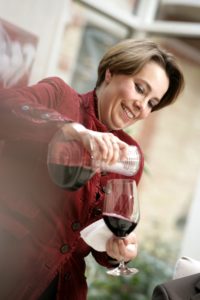
SOPHIE BERNHARD: Manager, Maître and Sommelier
Your first memories of wine?
When I was young I didn’t drink wine. I started when I had the luck to get to know the wives of other Michelin-starred Alsatian chefs and go with them to Bordeaux. We were accompanied by the Alsatian wine merchant Roger Bahl. He said that women make better sommeliers than men because they have a much stronger sensibility. That inspired me to become a sommelier and to be sure to get to know wine producers. If I know the producer, I am much more likely to like his or her wines and put them on our wine list. If I don’t like the producer, I still may like his or her wine, but I do not put it on our wine list. Wine and food are closely connected to emotions so I cannot promote the wine of a person I don’t get along with. Food and wine inspire memories and sentiments.
So you were already married when you went to Bordeaux?
Yes.
So up to then you did not work in Bernhard’s restaurant?
No, I did.
You weren’t yet a sommelier so what were your responsibilities?
I was the maître and business manager.
So was Roger Bahl your mentor?
Yes.
So it was the trip to Bordeaux and Mr. Bahl that inspired you to become a sommelier?
Yes, but after that trip, starting in 1996, I learned a great deal also from another female sommelier here in Baden-Baden. She’s German. Her name is Natalie Lumpp.
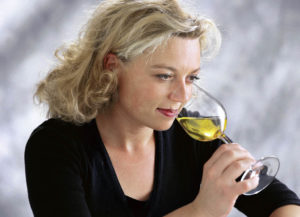
Natalie Lummp
She’s also a wine consultant and writer. We’ve always exchanged information, compared notes and we go together to tastings. That’s the way to learn to become a sommelier and to improve your knowledge.
Do you have an enological philosophy?
In the beginning my wine list had German, Alsatian, and French wines and some Spanish and Italian ones too. For the past five years, however, we’ve decided to limit our wine list to only the wines of producers we know personally. So now we have only German, Alsatian, and French wines. There are no longer Spanish and Italian wines on our list because we are a French restaurant in Germany. There are enough German and French wines to satisfy our needs. We have 400 labels on our list.
What are the essential qualities to be a top sommelier?
Sensibility.
What do you like most about your job?
Contact with people and the possibility to meet lots of different people.
The least?
Paperwork.
What do you especially like about Stéphan?
His strong character. His ability to lead others. He is like an orchestra conductor.
What irritates you about him?
Sometimes he is too spontaneous, impulsive, even if he claims to be very organized.
Other sommeliers that you admire?
Natalie Lumpp and Stéphane Gass. He’s the sommelier of Harald Wohlfahrt’s restaurant “Traube Tonbach” in Baiersbronn. It has three Michelin stars. Harald Wohlfahrt is considered the best chef in Germany. I exchange information with Stéphane Gass too.
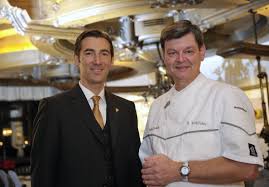
Gass and Wohlfahrt
Your favorite wine?
Champagne. There’s a saying: “Everyday you must drink a glass of champagne to celebrate the day before, that is yesterday. If it was a good day, then the champagne is a celebration. Instead, if yesterday had been a bad day, drinking the glass of champagne helps to forget, to put it out of your mind.”
Do you agree that what is never missing from your refrigerator at home is foie gras?
Yes, and champagne! And fruit too.
No cheese?
No, but we are very good friends with Bernard Anthony, the best cheese maker in the world. He’s the king of cheese, even if he’s a very modest person. He’s truly unique. He loves food and wine. He lives in Vieux-Ferrette near Basel; it’s in the farthest place you can go in the very south of Alsace. Stéphan and I both love cheese.
Do you have a collection?
I used to collect empty bottles of famous wines. Now I don’t have the space or the time.
If you had not become first a restaurant manager, head waiter, and then sommelier, what profession would you have chosen?
I studied mathematics and physics in school and economics at university. Only afterwards I changed to gastronomy. If not gastronomy, either working in a scientific laboratory or on an ecology project, especially one to preserve the Black Forest around Freiburg.
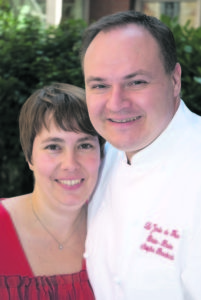
Sophie and Stéphan Bernhard
Do you have a pipe dream?
That our success continues; that we continue to have a good life.
